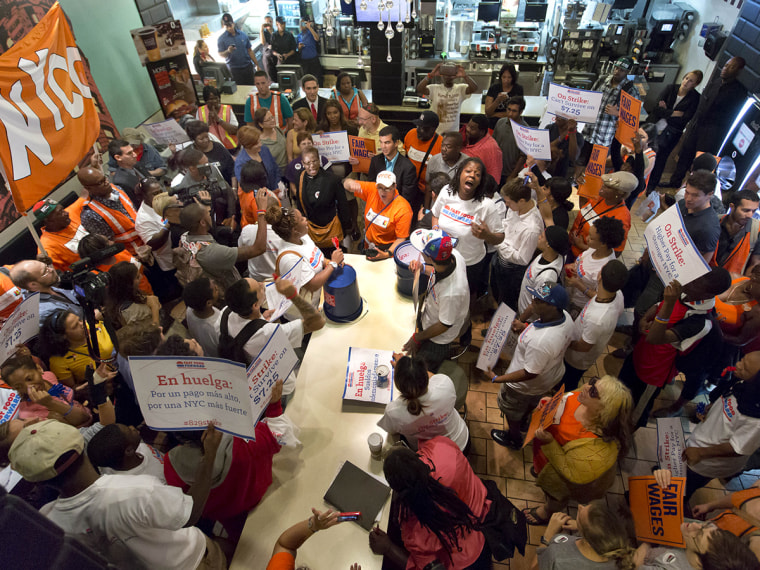Fast food workers staged a nationwide strike across dozens of American cities on Thursday morning, demanding a $15 per hour wage and the right to form a union. The strike, which is believed to be the largest in the industry's history, included work stoppages in regions of the country which had never seen concentrated fast food labor activism before.
Roughly 50 cities are affected by the strikes. Cities that have struck before and are striking again include New York, Chicago, St.Louis, Seattle, and Detroit. But far more cities are experiencing their first strike ever, including cities from Hartford, Conn., to Dallas, Texas, and Berkeley, Calif.
Growing national news coverage and social media buzz helped to fuel the strikes, according to workers and organizers.
"I've been watching the news, and I saw that a lot of fast food workers were organizing over the country," said Willietta Dukes, a Burger King employee in Durham, North Carolina. "And I felt like it was high time that I be heard." Thursday's fast food strike is the first to occur in Durham.
In a statement Thursday afternoon, McDonald's said that strikers were not characteristic of all their workers and that its stores would remain open.
"The story promoted by the individuals organizing these events does not provide an accurate picture of what it means to work at McDonald's. We respect the strong relationship which exists among McDonald's, our independent operators, and the employees who work in McDonald's restaurants. Our restaurants remain open, with our dedicated employees providing strong service to our customers. McDonald's aims to offer competitive pay and benefits to our employees. We provide training and professional development for all of those who wish to take advantage of those opportunities. Our history is full of examples of individuals who worked their first job with McDonald's and went on to successful careers both within and outside of McDonald's."
The last major labor action in the fast food industry occurred one month prior, when workers and activists from seven cities engaged in a series of rolling work stoppages over four days. That week of action was essentially a regional phenomenon: the participating cities, except for New York, were all based in the Midwest. This time, all of the strikes have been condensed into twenty-four hours, and are sweeping across all corners of the continental United States.
That includes the South, a region which presents unique challenges for the burgeoning low-wage workers movement. Organized labor is far weaker in the American South than in any of the regions where fast food strikes have previously occurred. Union density tends to be significantly lower in southern states, and many of them have right-to-work laws on the books, the result being that much of the region the local union infrastructure which was able to help organize previous strikes is lacking in the area.
"The fact that workers are going to strike is a sign of a significant turning point in the movement. It's really gone national," Columbia University professor Dorian Warren told CNN.
The traditional stumbling blocks to labor organizing in the South have not seriously impeded the fast food campaign, according to organizers.
"You would think it would be very hard to organize, because [North Carolina] is a right-to-work state and because people have been living under fear of being fired for the most minute issue ... but to be honest with you, people are just fed up," said Corine Mac, a Charlotte-based community organizer affiliated with the NAACP, Center for Community Change and the A. Phillip Randolph Institute.
North Carolina has the lowest union density in the country, with fewer than 3% of workers paying union dues.
Dearius Merritt, a striking Church's Chicken assistant manager in Memphis, Tenn., also described fast food workers in his city as "fed up."
"They're tired of coming to work and having to work eight hours, nine hours, and them coming home and they can barely provide for their kids," he said. When asked whether he was afraid of retaliation from management, he shrugged the question off, saying, "It's bigger than me and it's bigger than the workers that are standing up. It's not just going to help my generation, it's going to help the next generation that's going to come, and the generation after that."
While the fast food movement has received some assistance from traditional union outfits—with the large Service Employees International Union acting as a particularly key supporter—it has never relied entirely on established channels for labor organizing. The very first fast food workers strike, which occurred in late November, was put together in large part by the community group New York Communities for Change. Subsequent strikes have received crucial support from grassroots progressive groups, churches, and other non-union institutions.
The week of action which began on July 29 seems to have been a turning point in the movement, as it was the first fast food workers' action to receive significant national coverage. Rev. Herbert Lester, who helped organize workers in Memphis through the Workers Interfaith Network, said that the week of action galvanize workers in his city.
"We started reading and hearing about what other people in other parts of the country were doing, and the whole thing kind of coalesced as people did get together and talk about what was happening," he said.
